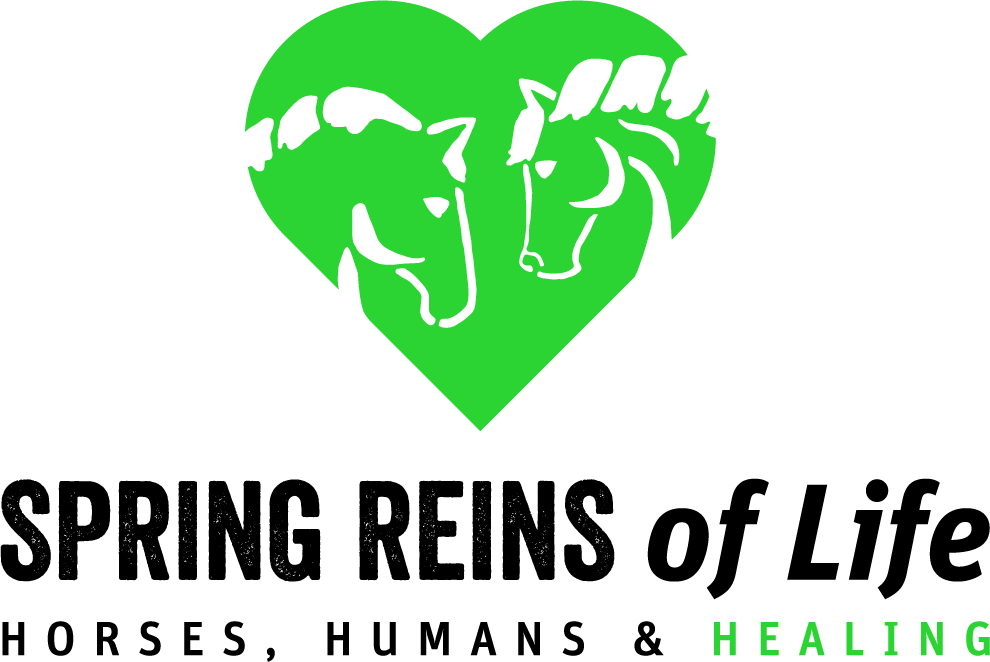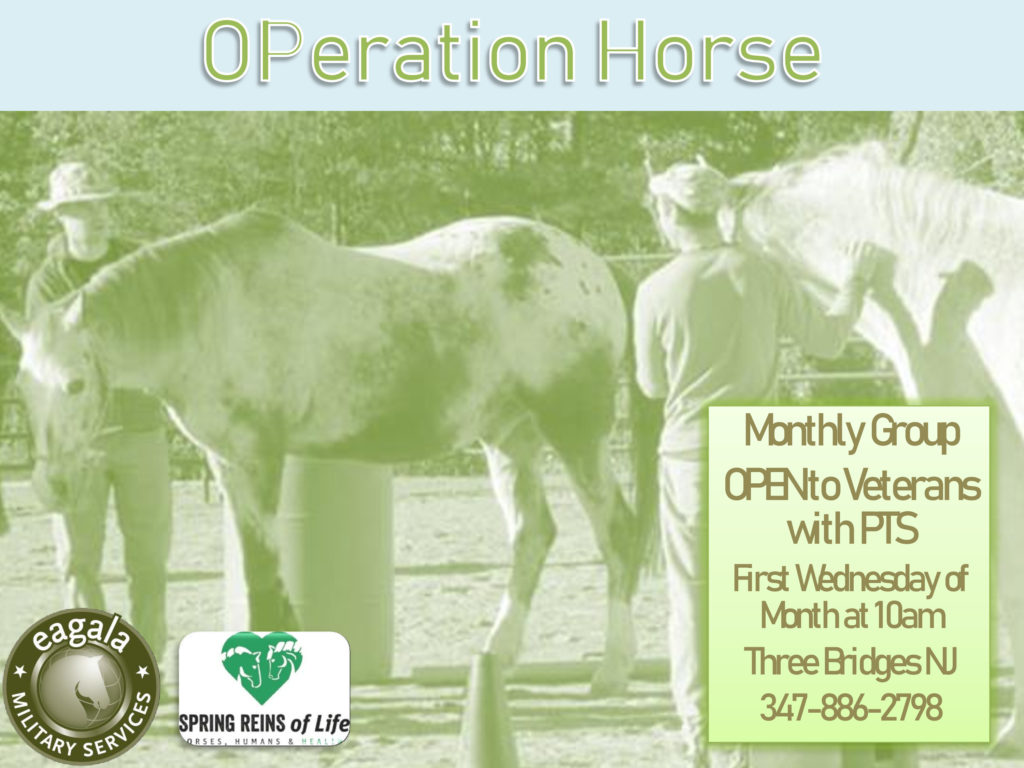NEW – 8Week Group for 8Veterans! Contact us – the group is Free!
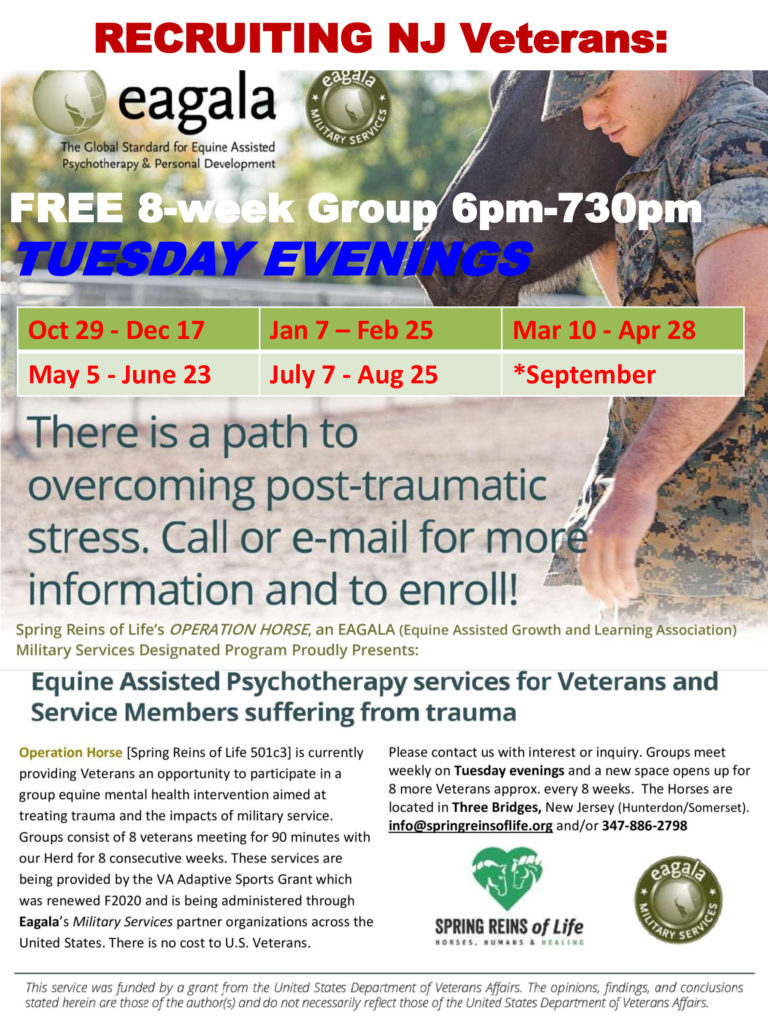
Ongoing: Monthly OPEN Group for Returning Veterans in Op Horse. Just Show Up!
“I can make a General in five minutes but a good horse is hard to replace!”
~ President Abraham Lincoln (1809-1865)
Operation HORSE
Equine Assisted Services for PTS Veterans
Horses Offer Combat Veterans A Place to Find Present Moment, Mindfulness, Re-built Trust and Develop Personalized Coping Skills —Without Having to “Talk About It”…
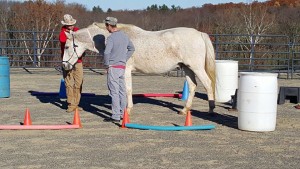
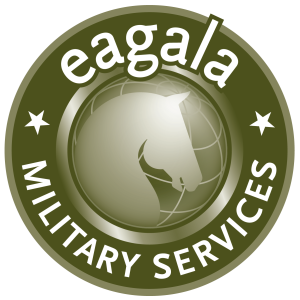
Spring Reins of Life *AWARDED (first program in New Jersey) the EAGALA Military Service Provider Certificate (2014). Knowing when to reach for help, recognizing signs of trouble, and enhanced self-awareness are also areas covered in this exploratory, support-based workshop and program. Additionally, we offer EAP services to military couples, families and family groups through our Coming HOME workshop program. All services from SROL are funded and free of charge to military veterans suffering from PTSD.
EAGALA Military Services Provider Video, March 2016
Spring Reins of Life 501c3 is proud to represent the state of New Jersey as a certified “Military Services Provider” since 2014. We have been serving PTSD combat veterans since August 2012.
At Spring Reins of Life we are aware many stressors warriors face as they are returning from war as veterans. We recognize that the circumstances and effects of war and combat often change people’s lives forever. We also believe that horses can help warriors redefine, or come to terms with their experience in a way that creates a personal path to follow in claiming one’s life back through the different set of lenses which now create perception.
Knowing that warriors have faced a myriad of combat traumas we understand and respect the space needed to come to terms with the internal struggle and challenges of post-combat trauma, injury, and loss. Equine Assisted Psychotherapy (EAP) is an intervention that provides a safe rehearsal space without any judgments to redefine thoughts and decisions about reconnecting to civilian life or returning to another tour of combat deployment.
The goal of Operation Horse (O.H.) is to assist warriors in developing coping skills to deal with traumatic experiences and foster wellness on their own terms. Combat veterans who are dealing with high-level stressors post-deployment as well as reintegration/retirement stages can benefit greatly from this program.
For many in the military, being away from home for long periods of time can cause adjustment problems at both home and work. In some cases warriors have completed repeated tours of duty and when on leave they cannot completely “be at home” because they know they are going to be deployed again. This is also true for the National Guard and Reserve troops who did not expect to be away for so long. Repetitive tours of duty, longer than normal deployments as well as retirement can surmount to high levels of stress and can manifest itself in different ways – increased divorce rates, spouse and child abuse, mental distress, substance abuse and maybe the most troubling is an increased rate of suicide.
While the stress that faces servicemen and women is real, a recent study (Hoge et al., 2004) suggested that service members are hesitant to seek help because they might be seen as weak, be treated differently or that others would lose confidence in them and their ability to perform. If servicemen and women are suffering due to the stressors of being good warriors, they need to be able to seek help so that they can alleviate this stress and therefore put the mental focus back to doing their job.
The psychological health needs of service members, their families and their survivors are daunting and growing. The evidence for this is substantial. Despite the suppressing effects of stigma, more than one third of active duty Soldiers and Marines self-report psychological health problems in the months following deployment, as to half of the members of the Reserve Component (DMSS, 2007). Rates of self-reported psychosocial and marital concerns are highest among service members exposed to the greatest degree of danger and who have repeatedly deployed. Further, the number of service members in these subgroups continues to grow.
~ (U.S. Army 2006; Wheeler, 2007)
We Can Help.
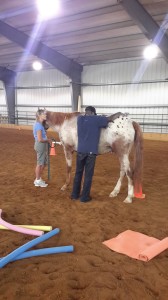
Spring Reins of Life is an organization which provides therapeutic animal-assisted intervention, utilizing horses to work as guides and partners in identifying potential problems and helping develop resolutions. We provide programs where warriors are teamed with an equine specialist, a licensed mental health professional and of course, our horses that are specifically selected for their ability and sensitivity to respond well with people. We operate as an EAGALA Model program which is solution-focused and based upon self-discovery from the feedback, reactions, and responses delivered by the horses. Participants learn about themselves by engaging in activities with the horses and then by discussing metaphors, feelings, behaviors, and patterns within their own context.
Horses respond to subtleties in our body language, and it is this focus on the non-verbals that can be very helpful. A person may “say” they feel a certain way, yet their body language reveals emotions of an entirely different scope. Horses sense this and demonstrate an ability to mirror and reflect a client’s emotional state. Persons participating in our program while working with our horses, our team, and this model often learn more about themselves, allowing them to experience “break-throughs”. These break-throughs allow one to identify underlying emotional issues, or to see an individual or family issue with more clarity while out of the home environment.
At Spring Reins of Life we are familiar with the barriers and special issues that surround the military. We have created ground-based exercises with our horses which are meant to target the emotional distress associated with military duty and deployments. This allows veterans and the facilitators to “see” where the challenges are and find new solutions that work. This process quickly creates situations that highlight unhealthy patterns and personal strengths or weaknesses. At the same time, pathways for new and more solid ways to cope and communicate can be re-enacted.
“The time for action is now. The human and financial costs of un-addressed problems will rise dramatically over time. Our nation learned this lesson, at a tragic cost, in the years following the Vietnam War. Fully investing in prevention, early intervention, and effective treatment are responsibilities incumbent upon us as we endeavor to fulfill our obligation to our military service members.”
~Report of the Department of Defense, Task Force on Mental Health, June 2007
Benefits of working with horses include:
Fostering resilience – activities re-create situations where frustrations, stressors, and relationship problems can arise. Warriors learn to adapt, improvise, and overcome perceived stressors as effectively at home as they do on the battlefield.
Adaptability – warriors must respond to the unpredictability and/or inability to “control” the horses and discover new ways to make relationships work. This offers real-time solutions to issues that may seem overwhelming at the onset.
Solution-focused – warriors find their own solutions to proposed exercises through hands-on experience; they learn to rely on themselves and their team members. The horses are able to provide immediate feedback as to whether choices made are ones that will work as solutions for each individual client.
Action, not talk – principles of healthy transitions are applied in real-time with the horses and can then provide parallels to be drawn upon by enacting or practicing healthier decision making processes. Without any verbal dialogue, the horses offer numerous ways in which creative problem solving can take place, and it is different for each individual, which is one reason it is so effective.
Horses can identify perfectly with the warrior/battlefield mentality
From ancient times through the conquest of the New World, a meticulously trained war horse was more valuable than a human slave. Such an animal could rear, strike, and kick out his back legs on command to injure or intimidate foot soldiers. He could leap to the side, slide to a stop, spin, and take off running without hesitation. Yet, he would also stand at attention in the midst of a raging battle for his master soldier to dismount and engage in hand-to-hand combat. The equine morphogenetic field scintillates with painful memories of countless immaculately trained, four-legged warriors who died in battle.
~ (Tao of Equus, Linda Kohanov)
Some signs of PTSD distress include but are not limited, to the following:
- Sleep disturbances, insomnia or nightmares
- Feelings of anxiety, depression or worthlessness
- Sudden panic attacks (constantly on guard or easily startled)
- Difficulty concentrating, feeling of heaviness or “decision fatigue”
- Overwhelming feelings of guilt
- Loss of appetite, feeling numb or detached from others
- Increased use of substances or other addictive behaviors
- Having trouble processing grief
- Sudden outbursts of irritability or anger (not able to control)
- Relationship/marital distress
- And others…
Soldiers and service members are seeking some form of mental health treatment after returning home from Iraq and Afghanistan
~ AP (Associated Press), June 2007
“Everyday, 5* US soldiers try to kill themselves. Before the Iraq war began that figure was less than one suicide attempt a day. The dramatic increase is revealed in the new US Army figures, which show that 2,100 soldiers tried to commit suicide in 2007. Suicide attempts are rising and have risen over the last five years higher than any recorded numbers from the past. The troops and their families are under unprecedented levels of stress due to the pace and frequencies of more than 5 years of deployments. Our brave service members who face deployment after deployment without the rest, recovery and treatment they need are at a breaking point. Post traumatic stress disorder may be a factor in the rising suicide attempts because left untreated it can lead to broken relationships and often leads to substance abuse of drugs or alcohol.”
~ CNN Reporting, February 2008
(RAND Study in 2010 increased this number to 18* per day)
(RAND report released in 2012, increasing this number to 22* per day)
- 1 in every 5 military personnel returning from Iraq & Afghanistan suffer from PTSD – 20% of all deployed in the past 6 years – that is over 300,000 warriors
- More than 43,000 troops were re-deployed in 2003 even though listed as medically unfit to return to war
- OEF/OIF veterans show the highest suicide rate of any war / 22.9-31.9 out of 100,000 compared to 8.3 per 100,000 of civilians
- Several reports show that there is a very long wait for mental health services within the VA and that once seen – there are not enough mental healthcare providers to assist the growing number of warriors in need (The Washington Post, RAND, 2009)
- Military Sexual Trauma (MST) is sexual harassment or sexual assault that occurs during service, it can happen to both men and women, although is most common within female warriors (17% of combat troops are women and 71% of female military personnel suffer trauma from MST within the ranks).
- As of 2010, there are more military deaths in the USA caused by suicide than on the battlefields of combat; 468 deaths by suicide and 462 deaths in combat for both Iraq and Afghanistan (Congress.org, January 27, 2011)
Hoge, C.W., Castro, C.A., Messer, S.C., McGurk, D., Cotting, D.I. & Koffman, R.L. (2004). Combat duty in Iraq and Afghanistan, mental health problems, and barriers to care. New England Journal of Medicine, 351, 13-22.
